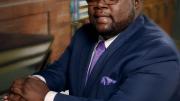When Braxton Shelley was five, he approached his church’s organist, fascinated by the man’s movement of hands and feet. The organist told Shelley, now assistant professor of music, to ask his grandmother to arrange lessons. She did. By nine, he was an accompanist at his church in Rocky Mount, North Carolina. At 15, he was promoted to minister of music at another church nearby—a kid instructing adults. But he earned their trust in rehearsals. “The central leadership capacity is listening,” he explains. “Listening to the folks you lead and having a sense of where they are, what they’re thinking, what they want, what they like.” He entered Duke in 2008, expecting to major in public policy and become a politician, but was instead gripped by music theory. It helped him translate his deep relationship with music into academic terms, but also made him realize how little attention the field paid to black gospel tradition. “There was this gap between the music I made—and that millions view as a primary devotional lexicon—and the academy, which had nothing to say about that.” As a Ph.D. student at the University of Chicago, he sought to fill that gap, writing the first dissertation to analyze gospel music as others would study Mozart symphonies. He also earned a master’s in divinity and was later ordained. “The practice [of ministry] helps me know what intellectual itches to pay attention to,” he says, “and the analysis helps me be a better practitioner.” He joined the faculty in 2017, at 26. “I kind of never got away from being too young for everything,” he jokes. His focus on listening is useful when leading student seminars in musicology, which he compares to playing a perpetual game of volleyball—always keeping the ball up. “I think it helps,” he says, “that I’m an improviser at heart.”
Musician and professor Braxton Shelley
Musician and professor Braxton Shelley
A gospel scholar shapes music theory.

Braxton Shelley
Photograph courtesy of Braxton Shelley
You might also like
Harvard’s Hasty Pudding Honors Rose Byrne
The Bridesmaids actress celebrated her 2026 Woman of the Year Award with a roast and a parade.
How a Harvard and Lesley Group Broke Choir Singing Wide Open
Cambridge Common Voices draws on principles of universal design.
Rabbi, Drag Queen, Film Star
Sabbath Queen, a new documentary, follows one man’s quest to make Judaism more expansive.
Most popular
Explore More From Current Issue

The True Cost of Grade Inflation at Harvard
How an abundance of A’s created “the most stressed-out world of all.”

Inside Harvard’s Most Egalitarian School
The Extension School is open to everyone. Expect to work—hard.

Bees and Flowers Are Falling Out of Sync
Scientists are revisiting an old way of thinking about extinction.





